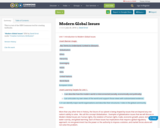
This is a test of the OER Commons tool for creating textbooks.
- Subject:
- Social Science
- Material Type:
- Textbook
- Date Added:
- 07/28/2016

This is a test of the OER Commons tool for creating textbooks.

Hip hop music is a staple of music lovers around the world. With its strong, rhythmic beat and lyrical rap vocal tracks, the genre that originated in New York City after the Civil Rights Movement has grown into one of the most popular styles of music in the world.
In this lesson, students will learn about hip hop as a tool for empowerment and critically analyze its place in American history as they read, analyze, and respond to film clips and lyrics from select songs. Through the discussion questions and activities, students will question the historical complexities and come up with their own interpretation of how music can be a tool for empowerment.
Students will answer questions before, during, and after watching the clips. Teachers may choose to have students create a social post/poem/rap about a social issue or create a presentation about a song with social justice themes. The lesson also allows students to explore other songs with social justice messages, across genres.
The activities in this lesson can be implemented across curricula, including, music, history, ELA, and non-academic classes (e.g., advisory).
More About This Resource
About the Authors:
This resource was developed by PBS Digital Innovator All Star Educators. The PBS Digital Innovator All Star program brings together a community of PreK-12th grade educators, who are hometown thought-leaders and classroom changemakers, for ongoing professional learning and growth. The program creates opportunities for participants to share strategies, learn from peers and leverage PBS platforms to elevate their own ideas and voice.
PBS Digital Innovator All Stars are characterized by their ability to seamlessly integrate media and digital technology into their learning environments, inspiring students to use media and emerging technologies in responsible, effective and empowering ways.
David Upegui is a Latino immigrant who found his way out of poverty through science. He currently serves as a science teacher at his alma mater, Central Falls High School (RI) and as an adjunct professor of Education. His personal philosophy and inclusive approach to science education have enabled students to become problem-solvers and innovative thinkers. He has a keen ability to engage students in learning, exploring, and contributing to science. He received the NABT’s Outstanding Biology Teacher Award (2021) and the Evolution Education Award (2014) as well as the Presidential Award for Excellence in Mathematics and Science Teaching in 2019 (2017 cohort). Upegui started, and runs, the school's Science Olympiad team and has contributed to several publications on science education and appropriate pedagogy. He completed his doctoral degree in education at the University of RI, focusing on science education and social justice.
Darnell Williams was born on the south-side of Chicago. As a child his family traveled to different parts of the United States during his father’s service in the Navy. Williams would go on and obtain his B.A in Childhood Studies of Psychology at Rutgers University- Camden. Soon after, Williams would become an English Language Arts teacher and Social Studies teacher. In 2020 Williams would have the honor of becoming a Digital Innovator and work on several projects. During this time, Williams would also obtain his Masters in Educational Leadership. Williams would be recognized for his educational leadership during the Covid-19 pandemic. He is currently the Supervisor of Pupil Services in Hamilton Township School District in Mays Landing, New Jersey. Williams in dedicated to serving staff and students in mental health and equity.
Sensitive: This resource contains material that may be sensitive for some students. Teachers should exercise discretion in evaluating whether this resource is suitable for their class.
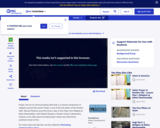
In this video segment from Religion & Ethics Newsweekly, learn about the daily prayer rituals of the Muslim faith and their significance in the life of a Muslim living in America.
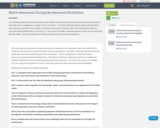
You will find a powerpoint with information about Native Americans during the American Revolution that discuss two tribes that are indigenous to region of the 13 colonies. It includes slides that discuss which side they allied with, why they made that choice, what contributions they made to the war effort, and making allies with their particular side benefited them in the long run. The resource includes a foldable worksheet that can me used along with the slides. I have my students cut it down and add it to their interactive notebook.
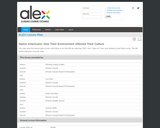
In this lesson, students will research one Native American group from each of the six main biomes in North America. Students will use their developing technology and language arts skills to find reliable sources on the internet, evaluate and integrate information from these texts, select a suitable digital platform to share their findings, and create a cohesive presentation showcasing their mastery of the learning outcomes. Students will discover the climate, landforms, water, and other natural resources available within each region and how they were used by the natives living there. Students will explore the relationships between the cultures found within each region and its resources. This unit was created as part of the ALEX Interdisciplinary Resource Development Summit.
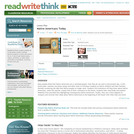
This lesson challenges students' views of Native Americans as a vanished people by asking them to compare their prior knowledge with information they gather while reading about contemporary Native Americans.
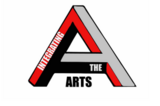
This resource was created by Tessa Avery and Chris Swalley, in collaboration with Dawn DeTurk, Hannah Blomstedt, and Julie Albrecht, as part of ESU2's Integrating the Arts project. This project is a four year initiative focused on integrating arts into the core curriculum through teacher education, practice, and coaching.
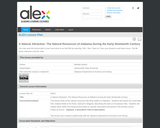
This lesson looks at the natural resources that drew settlers to Alabama. Students will explore the 1818 letter from Joseph Noble to his friend, Samuel B. Bidgood, describing the town at Tuscaloosa Falls. Students will explain ideas within this historical text based on specific information presented in this primary source. Follow up lesson - Alabama: A Boundless Field of Speculation This lesson was created in partnership with the Alabama Department of Archives and History.
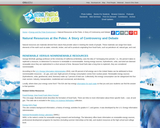
This article provides background information related to natural resources of the poles, and renewable and non-renewable energy.
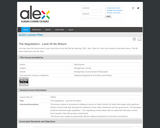
The lesson content is connected to Alabama Course of Study SS2010 (4) which will explain why significant leaders of the Creek War disrupted the Alabama Creek Indian Headsmen and the government. The disruption would be solved through negotiation. The negotiating Creek Indians did not obtain full restoration of their land, however, they did accept a compromise. This lesson was created in partnership with the Alabama Department of Archives and History.
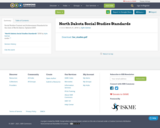
Social Studies Content and Achievement Standards for the state of North Dakota. Updated 2007.
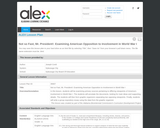
In this lesson, students will be examining primary sources pertaining to differing viewpoints of America's involvement in World War I. The students will annotate the documents, looking for main ideas and supporting details. The students will then form graphic organizers separating two opposing viewpoints. Finally, students will write a group expository essay using the data from the graphic organizer. This lesson was created as part of the Alabama Bicentennial Commission's Curriculum Development Project.

Washington state has developed a set of civics assessments that are multi‐stepped tasks or projects aligned to specific state standards, which target skills and knowledge necessary for engaged, informed citizenship.
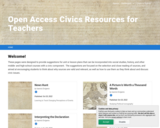
Suggestions for unit or lesson plans that can be incorporated into social studies, history, and other middle- and high-school courses with a civic component. The suggestions are focused on the selection and close reading of sources, and aimed at encouraging students to think about why sources are valid and relevant, as well as how to use them as they think about and discuss civic issues.
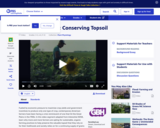
Against the backdrop of the devastating 1930's Dust Bowl, this video segment adapted from Interactive NOVA profiles an organic farmer and the techniques he uses to conserve topsoil.

George Washington was the first President of the United States of America. He is often referred to as the “Father of Our Country”. In this seminar you will learn about his life and what led to him becoming president. By the end of this seminar, you will be able to construct support for choosing George Washington as our first President and explain what events in his life made him a leader.Standards5.1.4 D Identify key ideas about government found in significant documents: Declaration of Independence, United States Constitution, Bill of Rights, Pennsylvania Constitution5.1.4 C Explain the principles and ideals shaping local and state government.
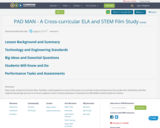
Film study of historical fiction film, Pad Man: a fictionalized account of the quest of a real-life social entrepreneur from India who ultimately used the engineering design process to reverse-engineer series of mini-machines to manufacture affordable sanitary pads for women.
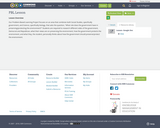
Our Problem-Based Learning Project focuses on an area that combines both Social Studies, specifically government, and Science, specifically biology, that asks the question, "What role does the government have in preserving/protecting the environment?" Students are required to research different sides of the government, Democrat and Republican, what their views are on preserving the environment, how the government protects the environment, and what they, the student, personally thinks about how the government should preserve/protect the environment.
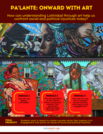
Students begin this unit by discussing their relationship with art, and the extent to which they believe art drives resistance movements. Students then participate in a Gallery Walk that highlights how members of the Puerto Rico community in the Young Lords used art to advance their ideas and preserve their culture. Students center the activism of Indigenous peoples in Puerto Rico by studying bomba music and murals. This helps them understand the roots of art—both visual and performance—as activism, and respond to the question: How can understanding Latinidad through art help us confront social and political injustices? Throughout this unit, students work in teams to create a poster series that inspires civic engagement and action on issues of social and political injustice.
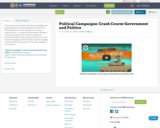
Crash Course Government: So political campaigns are a pretty big deal in the United States. For instance the 2012 presidential election clocked in at the most expensive ever - at around $6 billion dollars! Needless to say, money plays a very big role in American elections. So today, Craig is going to take a look at why we have campaigns in the first place, why the campaign seasons run for so long, and of course why campaigns cost so much.